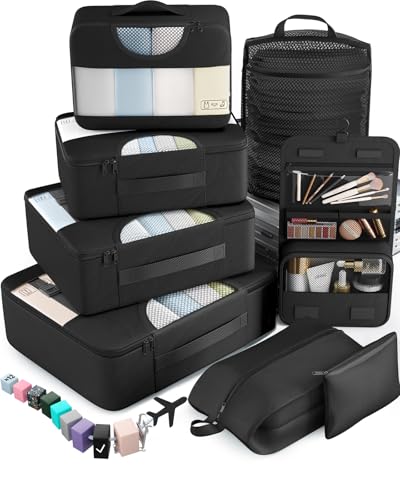In Egypt, they use Type C and F power plugs and outlets. The voltage is 220V, and the frequency is 50Hz.
⚠️ So, you’ll need a travel adapter in Egypt. Their plugs and outlets are different from the Type A and B ones we use back in the States.
Quick Overview of the Plugs in Egypt:
- Plug type in Egypt: C and F
- Standard voltage: 220V
- Frequency: 50Hz
- Need a travel adapter? Yes, you do need a travel adapter
- Need a voltage converter? Probably needed for some devices
- Recommended plug adapter: Vintar Universal Travel Adapter Kit
This information is gathered from local electricity agencies, IEC standards, and the experiences of travelers who’ve used these outlets abroad.
Power Outlets in Egypt
In Egypt, they use Type C and F power plugs and outlets.
Type C

Type C outlets have two round prongs and no grounding pin. Type E and F plugs usually fit too, but grounded plugs will need an adapter.
Type F

Type F outlets have two round prongs and grounding clips on the sides. Type C and E plugs will also fit.
The Only Travel Adapter You’ll Need in Egypt
A cheap, unreliable travel adapter can overheat, fry your devices, or stop working mid-trip—and no one wants that. We don’t sell them, but we’ve done serious research to find the safest and most reliable option for Egypt. Tested for compatibility, durability, and charging speed, this one won’t let you down:
Recommended Travel Plug Adapter
by 1,000+ travelers on Amazon
If you’re already on your way or at your destination without a power adapter, don’t stress. You can usually find one at the airport or in a local shop. Still, bringing one from home helps you avoid delays and start your trip with one less thing to worry about.
Travelers going through Egypt often visit Libya, Israel, and Sudan. Plug types may not be the same across borders.
Do You Need a Voltage Converter?
Before plugging in your electronics in Egypt, check the voltage. It’s different from the 120V used in the U.S., so you’ll likely need a converter.
Before plugging in your electronics abroad, always double-check the voltage label. If it says “100-240V, 50/60 Hz”, your device will work on both 120V and 220-240V power sources without a converter. This is common for tablets, laptops, cameras, and rechargeable toothbrushes.

Which Travel Devices May Need a Converter?
Play it safe with your electronics — browse the most trusted voltage converters here.
| Device | Need Converter? | Notes |
|---|---|---|
| Phone | ❌ No (usually) | Most modern phone chargers are dual voltage (100–240V) |
| Laptop | ❌ No (usually) | Check the power brick label for 100–240V |
| Hairdryer | ✅ Yes (often) | High wattage; many models are not dual voltage |
| Electric toothbrush | ⚠️ Check voltage | Some models are 110V only |
| Camera / DSLR | ❌ No (usually) | Most chargers are dual voltage |
| Power bank | ❌ No | Charges via USB, adapter is enough |
| Electric shaver / trimmer | ⚠️ Check voltage | Older or cheaper models may not support 230V |
| Tablet / iPad | ❌ No | All models are dual voltage |
| Portable fan | ✅ Yes (sometimes) | Many models are not compatible with 230V |
| Game console | ⚠️ Check voltage | Newer consoles like PS5 and Xbox are often dual voltage — check to be sure |
| Bluetooth speaker | ❌ No (usually) | Charges via USB |
| E-reader (Kindle, etc.) | ❌ No | USB charging only, no converter needed |
Top Travel Essentials to Pack
Some items are worth their spot in your bag. These travel-friendly tools are small, light, and surprisingly useful.
Digital Luggage Scale
Packing Cubes
Power Bank
No products found.
More About Egypt
Egypt is massive—over a million 1,000 square miles—and home to around 92 million people. It invented the 24-hour day, the 365-day calendar, and built jaw-dropping monuments that still launch the imaginations of travelers. With just about an inch of rain a year and 95% desert coverage, everything’s centered along the Nile and coastlines.
It’s a land of vibrant contrasts, where you’re likely to find friendly locals inviting you in for coffee, kids shouting hellos in streets, and yes, blonde Americans getting selfie requests. It’s safe so long as you travel smart, and hospitality isn’t just tradition—it’s a vibe you feel everywhere you go.
From pyramid fields and ancient temples to Red Sea reef diving and Sahara safaris, Egypt delivers travel in a deep-and-wide package. It’s a bucket-list destination that’s approachable—breathtaking, immersive, often affordable, and full of stories waiting for you to tell.
Top places to visit in Egypt: Cairo, Luxor, Aswan, Alexandria, Sharm el-Sheikh, and Hurghada.



